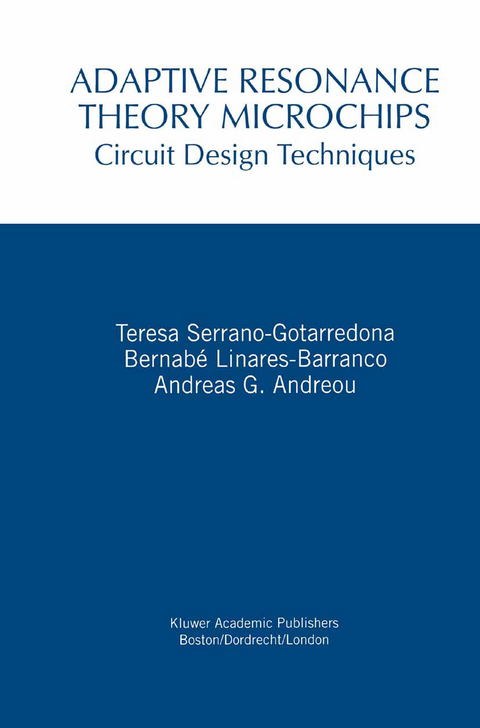
Adaptive Resonance Theory Microchips
Springer (Verlag)
978-0-7923-8231-7 (ISBN)
1. Adaptive Resonance Theory Algorithms.- 1.1 Introduction.- 1.2 ART1.- 1.3 ARTMAP.- 1.4 Fuzzy-ART.- 1.5 Fuzzy-ARTMAP.- 2. A Vlsi-Friendly ART1 Algorithm.- 2.1 The Modified ART1 Algorithm.- 2.2 Functional Differences between Original and Modified Model.- 3. ART1 And ARTMAP Vlsi Circuit Implementation.- 3.1 Introduction.- 3.2 Hardware-Oriented Attractive Properties of the ART1 Algorithm.- 3.3 Circuit Description.- 3.4 Modular System Expansivity.- 3.5 Implementation of Synaptic Current Sources.- 3.6 Experimental Results of First Prototype.- 3.7 Experimental Results of Second Prototype.- 4. A Current-Mode Multi-Chip WTA-MAX Circuit.- 4.1 Introduction.- 4.2 Operation Principle.- 4.3 Circuit Implementation.- 4.4 System Stability Coarse Analysis.- 4.5 System Stability Fine Analysis.- 4.6 Experimental Results.- 5. An ART1/ARTMAP/Fuzzy-ART/Fuzzy-ARTMAP Chip.- 5.1 The Synaptic Cell.- 5.2 Peripheral Cells.- 5.3 Concluding Remarks.- 6. Analog Learning Fuzzy Art Chips.- 6.1 Introduction.- 6.2 Summary of the Fuzzy-ART Algorithm.- 6.3 Current-Mode Fuzzy-ART Chip.- 6.4 Fuzzy-ART/VQ Chip.- 6.5 Conclusions.- 7. Some Potential Applications For Art Microchips.- 7.1 Portable Non-invasive Device for Determination of Concentrations of Biological Substances.- 7.2 Cardiac Arrhythmia Classifier for Implantable Pacemaker.- 7.3 Vehicle Interior Monitoring Device for Auto Alarm.- 7.4 Concluding Remarks.- Appendices.- A- MATLAB Codes for Adaptive Resonance Theory Algorithms.- A.1 MATLAB Code Example for ART1.- A.2 MATLAB Code Example for ARTMAP.- A.3 MATLAB Code Example for Fuzzy-ART.- A.4 MATLAB Code Example for Fuzzy-ARTMAP.- A. 5 Auxiliary Functions.- B- Computational Equivalence of the Original ART1 and the Modified ART1m Models.- B. l Direct Access to Subset and Superset Patterns.- B. 2 DirectAccess by Perfectly Learned Patterns (Theorem 1 of original ART1).- B. 3 Stable Choices in STM (Theorem 2 of original ART1).- B. 4 Initial Filter Values determine Search Order (Theorem 3 of original ART1).- B. 5 Learning on a Single Trial (Theorem 4 of original ART1.- B. 6 Stable Category Learning (Theorem 5 of original ART1.- B. 7 Direct Access after Learning Self-Stabilizes (Theorem 6 of original ART1).- B.8 Search Order(Theorem 7 of original ART1).- B.9 Biasing the Network towards Uncommitted Nodes.- B.10 Expanding Proofs to Fuzzy-ART.- B. 11 Remarks.- C- Systematic Width-and-Length Dependent CMOS Transistor Mismatch Characterization.- C.1 Mismatch Characterization Chip.- C.2 Mismatch Parameter Extraction and Statistical Characterization.- C.3 Characterization Results.- References.
| Reihe/Serie | The Springer International Series in Engineering and Computer Science ; 456 |
|---|---|
| Zusatzinfo | XXIII, 234 p. |
| Verlagsort | Dordrecht |
| Sprache | englisch |
| Maße | 155 x 235 mm |
| Themenwelt | Mathematik / Informatik ► Informatik ► Theorie / Studium |
| Technik ► Elektrotechnik / Energietechnik | |
| ISBN-10 | 0-7923-8231-5 / 0792382315 |
| ISBN-13 | 978-0-7923-8231-7 / 9780792382317 |
| Zustand | Neuware |
| Haben Sie eine Frage zum Produkt? |
aus dem Bereich


